 | |
Latvia | Mexico |
|---|---|
The nations of Latvia and Mexico established diplomatic relations in 1991. Both nations are members of the Organisation for Economic Co-operation and Development and the United Nations.
 | |
Latvia | Mexico |
|---|---|
The nations of Latvia and Mexico established diplomatic relations in 1991. Both nations are members of the Organisation for Economic Co-operation and Development and the United Nations.
In November 1918, Latvia declared its independence from the Russian Empire after World War I. In May 1927, Mexico recognized Latvia's independence. [1] During World War II, Latvia was occupied by both Nazi Germany and the Soviet Union and after the war, Latvia was forcibly annexed by the Soviet Union in 1944.
In May 1990, Latvia obtained its independence after the dissolution of the Soviet Union. Mexico recognized the independence of and re-established diplomatic relations with Latvia on 27 November 1991. [1]
In September 1993, Latvia opened an honorary consulate in Mexico City. In 2000, Mexico opened an honorary consulate in Riga. [1] In June 2000, Mexican Foreign Undersecretary, Juan Rebolledo Gout, paid a visit Latvia and met with President Vaira Vike-Freiberga in Jūrmala. [2]
In March 2004, Latvian President Vaira Vike-Freiberga paid a visit to Mexico to attend the European Union, Latin America and the Caribbean Summit in Guadalajara and met with President Vicente Fox. [3] In 2007, Mexican Foreign Undersecretary Lourdes Aranda Bezaury paid a visit to Latvia to attend the third political consultations between the Ministries of Foreign Affairs of both nations. [4] During the third political consultations, Latvia and Mexico discussed current issues related to domestic and foreign policy activities and exchanged views on global issues such as the UN reform, climate change and environmental protection, disarmament, and weapons of mass destruction. [4]
In recent years, Foreign Ministerial meetings of both countries have been held in different international forums such as the meeting between Mexican Foreign Minister Patricia Espinosa and Latvian Foreign Minister Ģirts Valdis Kristovskis, held in the framework of the 66th General Assembly of the United Nations in September 2011. Both Foreign Ministers discussed the presence of Mexican multinational company CEMEX in Latvia and discussed climate change and the prospects for cooperation within the United Nations. [5]
In April 2013, Latvian Foreign Vice-Minister Andris Teikmanis paid a visit to Mexico and met with his counterpart Foreign Undersecretary Carlos de Icaza. [6] In 2023, Latvian Deputy State Secretary Andžejs Viļumsons co-chaired the Fifth Meeting for Political Consultations between Mexico and Latvia in Mexico City, along with his counterpart Foreign Undersecretary Carmen Moreno Toscano. [7]
High-level visits from Latvia to Mexico [1] [6] [3] [7]
High-level visits from Mexico to Latvia [1] [5] [4]
Both nations have signed a few bilateral agreements such as a Memorandum of Understanding for the Establishment of a Mechanism of Bilateral Political Consultations in Matters of Common Interest (2000); Agreement on the suppression of visas for diplomatic and official passport carriers (2002); Agreement of Cooperation in the areas of Education, Culture and Sports (2005); and an Agreement to Avoid Double Taxation and Prevent Tax Evasion on Income Tax and its Protocol (2012). [8] [1]
In 2023, trade between both nations totaled US$181 million. [9] Latvia's main exports to Mexico include: telephones and mobile phones, electrical equipment, peat, alcohol, fiberglass, chemical based products, motor vehicles for special uses, wires and ropes, and plastic articles. Mexico's main exports to Latvia include: lead minerals and their concentrates, fiberglass, alcohol (beer), pepper, fruits and nuts, and coffee. Latvian company Zabbix operates in Mexico. [10]

Neither country has a resident ambassador.

Latvia–Russia relations are the bilateral foreign relations between Latvia and Russia. Latvia has an embassy in Moscow, and the Russia has an embassy in Riga.
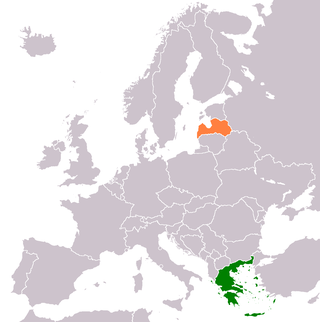
Greek-Latvian relations are the bilateral relations between Greece and Latvia. Both countries are full members of the Organization for Security and Co-operation in Europe, of NATO and the European Union. The Latvian embassy in Athens was established in 1998. Latvia also has two honorary consulates in Piraeus and in Thessaloniki. The Greek embassy in Riga was opened in January 2005.
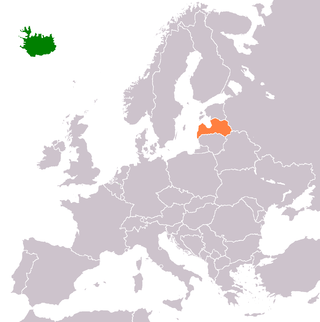
Iceland–Latvia relations are bilateral relations between Iceland and the Republic of Latvia. Iceland was the first country to recognize the independence of Latvia in August 1991. Both countries re-established diplomatic relations on 22 August 1991. Neither country has a resident ambassador. Iceland is represented in Latvia through its embassy in Helsinki, Finland. Latvia is represented in Iceland through its embassy in Oslo, Norway and an honorary consulate in Iceland's capital Reykjavík.
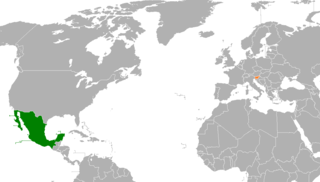
The nations of Mexico and Slovenia established diplomatic relations in 1992. Both nations are members of the Organisation for Economic Co-operation and Development and the United Nations.

The nations of Egypt and Mexico established diplomatic relations in 1958, however, the two states interacted non-officially before then. As early as 1861 Egyptian soldiers joined French Emperor Napoleon III invasion of Mexico. In the early 20th century, Mexico opened a consulate on the Mediterranean port city of Alexandria. Since Egypt's independence in 1960, both nations have maintained a warm relationship based on cultural exchanges, tourism and trade.
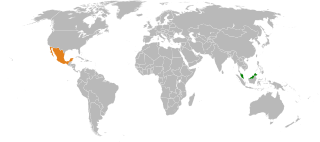
The nations of Malaysia and Mexico established diplomatic relations in 1974. Both nations are members of the Asia-Pacific Economic Cooperation, Forum of East Asia–Latin America Cooperation and the United Nations.

The nations of Bangladesh and Mexico established diplomatic relations in 1975. Both nations are members of the United Nations and the World Trade Organization.
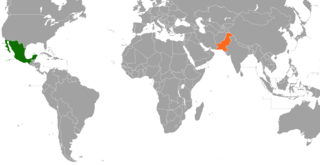
The nations of Mexico and Pakistan established diplomatic relations in 1955. Both nations are members of the United Nations and the World Trade Organization.

The nations of Mexico and Nigeria established diplomatic relations in 1976 and are two regional power nations in Latin America and Africa, respectively. Both nations are members of the Group of 15, Group of 24 and the United Nations.
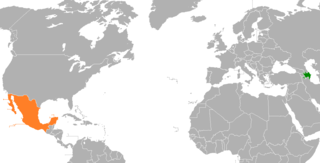
The nations of Azerbaijan and Mexico established diplomatic relations in 1992. Both nations are members of the United Nations.
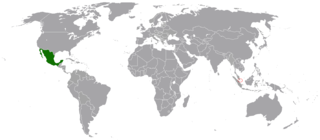
The nations of Mexico and Singapore established diplomatic relations in 1975. Both nations are members of the Asia-Pacific Economic Cooperation, Forum of East Asia–Latin America Cooperation and the United Nations.

The nations of Kazakhstan and Mexico established diplomatic relation sin 1992. Both nations are members of the United Nations and the World Trade Organization.
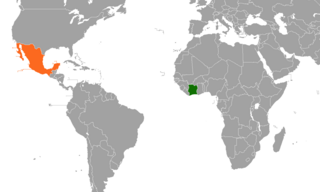
The nations of the Ivory Coast and Mexico established diplomatic relations in 1975. Both nations are members of the Group of 24 and the United Nations.
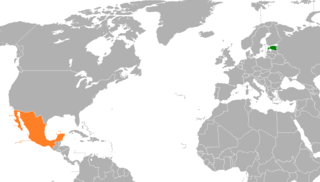
The nations of Estonia and Mexico initially established diplomatic relations in 1937, however, relations were broken after the annexation of Estonia by the USSR in 1944. Diplomatic relations were re-established in 1991. Both nations are members of the Organisation for Economic Co-operation and Development and the United Nations.

The nations of Lithuania and Mexico initially established diplomatic relations in 1938, however, diplomatic relations were interrupted with Lithuania's annexation by the Soviet Union. In 1991, both nations re-established diplomatic relations.

The nations of Luxembourg and Mexico established diplomatic relations in 1947. Both nations are members of the OECD and the United Nations.

The nations of Mexico and Sri Lanka established diplomatic relations in 1960. Both nations are members of the United Nations.

The nations of Cyprus and Mexico established diplomatic relations in 1974. Both nations are members of the United Nations.

The nations of Mexico and Tunisia established diplomatic relations in 1961. Both nations are members of the United Nations.

The nations of Mexico and Oman established diplomatic relations in 1975. Both nations are members of the United Nations.